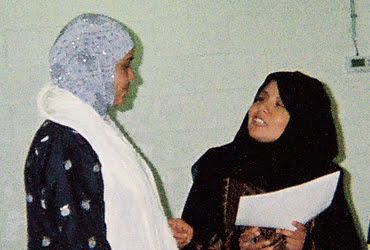The 9th Annual Gathering of Latina Sisters in Chicago
By Ingrid Ascencio d’ Farrukh
The 9th Annual Gathering of Latina Sisters in Chicago was held on May 24, 2009 in the Youth Center of the ICCI Masjid. Allah (subhanahu wa ta’ala) made it possible once again, for this group of women to get together and share an afternoon of topics of interest, delicious food and a warm environment full of hugs and kids. The entire program was held in Spanish, and after the formal welcome and introduction of the event, little Sarita Hashlaman (7 years old) gave a beautiful recitation of Surah Ash-Shams and Ayat Al Kursi to invite the blessings into the occasion. The main theme for this year’s event was “The role of the Latina Muslim as contemporary women.â€

The presentation started with the topic of Mrs. Jen Ai Aristizabal on “Transition of Cultural Identity.†After defining the term identity, the question of what is it that identifies us as Latino women was addressed. There are things such as: language, rhythm, sentimentality, religion, and fervor. In the religious aspect, the Latino of today is really a mixture of the European Catholic, Aboriginal polytheist, and African animistic. The focus of the talk was on the Catholic aspect because it’s the most common practiced religion in Latin America today, which has very peculiar practices that distinguishes it from other regions in the world. For example, in Mexico, the native aborigines had their deities replaced with Catholic saints: Tlaloc (god of water) became known as Saint Isidro Labrador, Tonantzin or Xihuacoatl (goddess mother of all other deities) became Virgen De Guadalupe, etc. There were other examples given for the Caribbean region and the known practice of ‘santeria’, as a result of merging African Yoruba religion with Roman Catholic and Native American traditions. From these examples, we conclude that the Latino is really a hybrid of many other practices, a fusion of characters and flavors. However, the Fitra or innate disposition of human nature has guided us by the will of Allah (subhanahu wa ta’ala) back to Islam – the true, pure state of monotheistic belief.
During our religious conversion, we begin a transitional process of values in which many dilemma arise. The ambivalence or contradictory feelings that were initiated by the cultural shock result in a mental and emotional state of perplexity, as a product of transferring the cultural and spiritual values of one group to another. Therefore, we should not overwhelm ourselves with the transition of our habits and ideas; we should seek Allah’s refuge and take Islam one step at a time. It is important to remember that it should be a gradual change. This does not mean we should allow ourselves to be lazy and take a long time to embrace the correct practices. We are obliged to continue our education in our religion and strive for improvement in our behavior, words, and beliefs. However, we must be patient with ourselves and with one another. And, remember that we are not stripping ourselves away from our essence – we are only improving it.
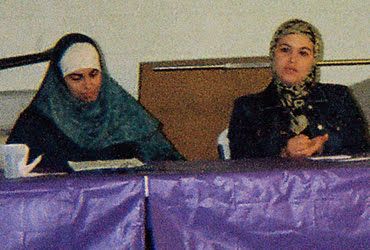
The second presentation was given by Mrs. Ingrid Ascencio on the topic of “Friendship and Sisterhood in Islam.†She discussed how friendship is one of the most important social aspects in our lives. She also reminded us about the hadith in which the Prophet (sallallahu alayhe wa sallam) mentioned how we must be careful in choosing our friends, because the person inevitably follows the steps of his or her companion. Another example mentioned by the Prophet (sallallahu alayhe wa sallam) was the analogy made of a good friend to a seller of musk while a bad friend is like the one who blows in the blacksmith’s bellows.
Friendship has many important aspects. In general, the Muslim must maintain good manners and show kindness to everybody. However, some characteristics or experiences make us naturally inclined towards a certain type of people versus another. It could potentially be due to ties of similar faith, habits, traits, or experiences. Keep in mind that the ties of brotherhood based on the Islamic faith is one of the greatest blessings from Allah (subhanahu wa ta’ala) since these acquaintances create a social circle. Hopefully, this social circle is formed of believers who are good in character, because they are essential in a support group that lives up to Islamic principles.
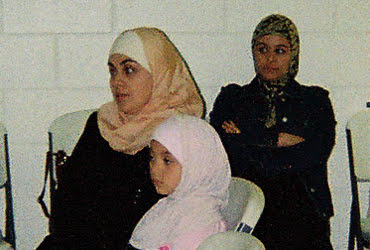
We must bear in mind some advice regarding our relations with our friends and brothers/sisters in faith. First, remember to always give the proper greeting of ‘salam’, because this is the first step that opens the hearts. Also, keep your intention firm in loving each other for Allah’s sake, because those who do so have been promised to have the shade of Allah on the Day of Judgment. In addition, the Golden Rule applies, because we must wish for others what we would wish for ourselves. We can keep our hearts clean of disease by following several guidelines such as refraining from gossip, slander, and backbiting, concealing the faults of others, forgiving, and in case of disputes, following the limit of three days to cool off. We are never allowed to break ties or distance ourselves permanently from one another.
We have to remember that in the end the final recompense is not from others, but from Allah (subhanahu wa ta’ala), The Most Merciful. Allah will remove our distress and our hardship, and He will have our faults covered in this world if we are this way toward our fellow brothers and sisters.
The final topic “Modesty in Islam†was presented by Mrs. Celia Snowber. She began by explaining how all the Prophets and Messengers of Allah (subhanahu wa ta’ala) encouraged Haya. Haya is usually translated as modesty and shyness. This concept plays a very important role in the affairs of the Creator and the creation. Modesty in Islam is reflected by a Muslim in his/her way of talk, clothing as well as in his/her public and secret behavior.
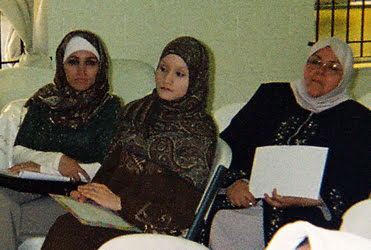
Any talk regarding modesty starts in the heart, because the Prophet (sallallahu alayhe wa sallam) mentioned how modesty is part of faith, and faith resides in the heart. The Muslim must be cautious when talking and must be moderate in his/her conversations. Using obscene words, shouting when angry, and lying are not acceptable qualities in Islam.
Modesty in clothing is described in the Qu’ran (24: 30-31): “Say to the believing men that they should lower their gaze and guard their modesty: that will make for greater purity for them: And Allah is well acquainted with all that they do. And say to the believing women that they should lower their gaze and guard their modesty; that they should not display their beauty and ornaments except what (must ordinarily) appear thereof; that they should draw their veils over their bosoms and not display their beauty except to their husbands, their fathers, their husband’s fathers, their sons, their husbands’ sons, their brothers or their brothers’ sons, or their sisters’ sons, or their women, or the slaves whom their right hands possess, or male servants free of physical needs, or small children who have no sense of the shame of sex; and that they should not strike their feet in order to draw attention to their hidden ornaments. And O ye Believers! turn ye all together towards Allah, that ye may attain Bliss.â€
In these ayat, Allah (subhanahu wa ta’ala) teaches us how to dress and who are excluded from the hijab. The modesty protects women from being a prisoner, a victim of society, because her clothing not only protects her, but identifies her as a believing woman.
The Prophet (sallallahu alayhe wa sallam) told his companions to be modest in front of Allah (subhanahu wa ta’ala). Allah (subhanahu wa ta’ala) wants you to protect your mind from what you have learned, your stomach from what you have eaten. He requests that we remember death and its tribulations and that we leave the adornments of this life for those who wish goodness in the next life. The daily conduct of a Muslim has to do with rememberance of the presence of Allah (subhanahu wa ta’ala) in every moment of his/her life, because this awareness is what helps to acquire modesty. The shyness towards our Creator develops when the Muslim understands that Allah (subhanahu wa ta’ala) knows everything we do and he/she has shame of committing something that would displease the All-Mighty. The Prophet (sallallahu alayhe wa sallam) said that every religion has its characteristics and that the characteristic of Islam is Haya (modesty, shyness).
The evening ended with great gems of knowledge in our hearts and minds and with a renewed sense of sweetness in our faith and in our bonds towards each other. The event came to an end with a closing du’a and the Asr prayer. Wonderful dishes were shared in good-natured company among all the participants and kids.
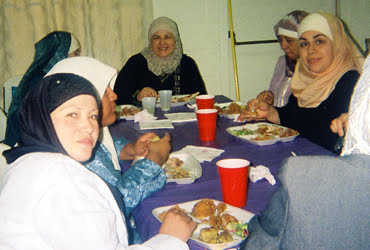
May Allah (subhanahu wa ta’ala) keep us growing in love and knowledge of our faith.
The agenda of the program follows:
“La Gran Novena Confraternidad Annual para las hermanas”
es presentado por LADO
Latino American Dawah Organization
Domingo, 24 de mayo del 2009
Assalam Aleikum!
4:00 PM Introducion y Bienvenida
4:05 PM Recitacion del Quran: niña Sara Haslaman
4:20 PM Presentacion del tema: El Rol De La Musulmana Latina, Como Mujer Contemporanea
Expositoras del tema: Jenai Aristizabal, Ingrid Ascencio y Celia Snowber
5:00 PM Breve pausa del tema (aproximadamente 5 minutos)
5:05 PM Continuacion y conclusion del tema
5:35 PM Entrega de Certificados
5:40 PM Anuncio de programa y actividades
5:50 PM Agradecimiento
5:50 PM Conclusion del evento
6:00 PM Oracion Asar (ir a la oracion)
6:00 PM Cena y Socializacion (de la oracion Asar)
A Thank You Note:
First of all, Alhamdulillah, praise be to Allah SWT.
It is really appreciated that this event was supported and
hosted by LADO and a committee of the Latina Muslim Sisters of Chicago.
Acknowledgement:
During the event, sister Idalia Nieves was given a Certificate of Recognition for satisfactorily completing a course entitled “Fundamentals of Islam.” The course was a program developed by the ‘Clases Islamicas en español para hermanas ‘ and hosted by the Latina Muslim Sisters of Chicago.
